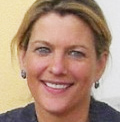 “Global vaccine confidence is relatively high – over 80%. While that’s positive, we cannot rest on our laurels,” says Dr Heidi Larson, Director of the Vaccine Confidence Project at the London School of Hygiene and Tropical Medicine (LSHTM).
“Global vaccine confidence is relatively high – over 80%. While that’s positive, we cannot rest on our laurels,” says Dr Heidi Larson, Director of the Vaccine Confidence Project at the London School of Hygiene and Tropical Medicine (LSHTM).
Dr Larson has been looking at attitudes to immunisation for more than a decade and has just published a new report – The State of Vaccine Confidence – which surveys opinion in five countries: the UK, Georgia, Pakistan, India and Nigeria.
Addressing public trust in vaccines
By taking the temperature of vaccine confidence, her team hopes to highlight outbreaks of vaccine hesitancy before a fever breaks out.
A very small number of people outright refuse to follow recommended vaccine schedules.
Others are described as ‘hesitant’. This hesitancy – which could be a request to adapt the recommended immunisation schedule, reluctance about immunisation programmes or specific questions about a particular vaccine – may be a warning sign that vaccine uptake is threatened. This in turn could predict outbreaks of infectious disease.
“Our findings are positive in parts. The concern is about the growing fringe. Even a 1% negative shift in sentiment could destabilise things,” Dr Larson told Vaccines Today.
Global view
Dr Larson first became interested in public trust in immunisation around 2003. She saw how false rumours in northern Nigeria were impacting on the worldwide effort to eradicate polio. And around the same time in the UK, an entirely different – but also unfounded – myth was affecting uptake of measles vaccination.
“There was no relationship between these two but both were significant events in different parts of the world. This was hard evidence of how rumours can have a real public health impact,” says Dr Larson. “It also showed that it’s not all about safety concerns, there are other things we need to pay attention to.”
She says that issues around vaccine confidence “go back to Jenner” but that information now moves much more quickly than it did even 10 years ago. People can share information online in an instant, making it easier for rumours to jump across borders.
Vaccine scepticism: more than misplaced safety fears
On the upside, the tools for researching public opinion are much more advanced than in the past.
The new report marks the first collaboration between the Vaccine Confidence Project and Gallup International, a global polling company.
The research pilots a set of questions about confidence in health systems, health workers, family planning services, emergency services and immunisation programmes.
The survey then explores whether people have ever hesitated about bringing their children for immunisations. The answers were categorised as being questions of ‘confidence, convenience or complacency’.
“The final litmus test question was whether those who hesitated actually went ahead and had the vaccine in the end,” says Dr Larson. “That’s where some of the really interesting results were found.”
Cultural differences
The UK had the highest percentage of respondents reporting hesitancy (24.5%) but only around a quarter of those actually opted out of vaccination. In contrast, just 7.4% of people surveyed in Georgia said they were hesitant but 60% of those actually refused.
Some of this variation could stem from differing perceptions of what it means to be hesitant but there was a clear link between high levels of hesitancy and confidence in immunisation programmes.
For example, the overall figure for vaccine hesitancy in Nigeria was just 8.5% but three quarters of these were in Kano state in north-west Nigeria where vaccine uptake is lower than the rest of the country.
“These findings gave us more confidence in the questions we were asking. We saw a very high correlation between strong confidence in immunisation programmes and lower hesitancy rates,” says Dr Larson.
Vaccine confidence: early intervention is key
The Gallup survey is not the only feature of the research project. The team is also examining information from social media. Where there are signs that public confidence is waning or rumours are spreading on Facebook, it could be an opportunity for public health intervention.
“This survey is like a vulnerability index. If there’s a country that the Confidence Index shows has lots of [vaccine] hesitancy and there is real-time data showing growing concerns, we can advise a country on which issues might be high priority,” she says. “Outbreaks of concern are more likely to take hold where there is low confidence and high hesitancy.”
Crisis prevention better than cure
The team at the LSHTM is publishing its work so that others can use the findings and perhaps even repeat the research in their own countries. “We hope to add more countries to our map in order to get a global picture,” says Dr Larson.




